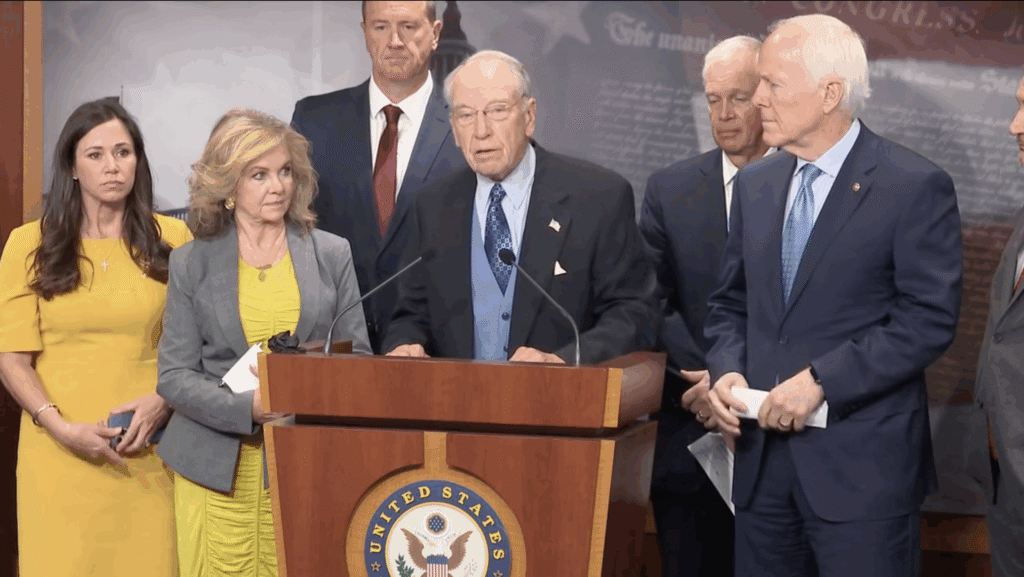Newly surfaced documents allege a pattern of political targeting that critics say shows the Biden administration, through the Department of Justice and the FBI, used instruments of law enforcement to monitor Republican phones and conservative organizations. The papers sketch a picture of aggressive surveillance and selective investigations that have left lawmakers and activists unsettled. Senator Ron Johnson summed up the concern bluntly, warning that “sabotage” is ongoing.
The documents purport to show instances where investigative power crossed into political policing, creating a sense that the agencies involved were acting with partisan intent. For conservatives watching, this is not just bad policy; it reads like an institutional tilt toward one party. That perception erodes confidence in neutral law enforcement and raises serious constitutional questions.
Allegations of phone monitoring and surveillance of conservative groups strike at the heart of privacy and free speech rights. When people fear the phone or email could trigger an inquiry, it chills ordinary political activity and civic engagement. The effect is tactical: grassroots organizing, donations, and public criticism all risk being treated as suspicious behavior under vague or expanding standards.
Republican leaders have pointed to these disclosures as proof of a broader pattern, arguing that the DOJ and FBI were used as political tools rather than neutral enforcers of the law. That argument frames the story as more than individual mistakes; it suggests an operational strategy that favored one political constituency. For voters who value limited government, those are alarming implications about how power gets exercised in Washington.
Legal experts watching this debate note the difference between lawful investigation and politically motivated surveillance, and those lines can be thin when agencies answer to the executive branch. Courts and Congress have established rules to prevent abuses, but leaks and internal memos can expose how practices drift. That drift matters because it shows what happens when oversight is weak and institutional norms break down.
The political fallout is immediate and practical. Lawmakers demand documents, hearings, and answers, while conservative activists look for legal relief and public accountability. Those reactions feed into an already polarized environment where every discovery of wrongdoing is amplified and weaponized in its own right. The cycle risks turning the justice system into a permanent battlefield for partisan combat.
Beyond politics, there are administrative consequences inside the agencies named in the documents. Career employees face morale problems when their work is framed as part of a political campaign rather than as neutral public service. That reputational damage is hard to repair, and long-term institutional trust takes years to rebuild once it cracks.
At the same time, defenders of the agencies argue that national security and public safety sometimes require aggressive methods, and that raw documents can be misleading without context. They say surveillance and probes must be judged by legal standards and outcomes, not just the appearance of a partisan tilt. Still, the appearance matters a great deal when checks and balances are supposed to prevent exactly this kind of misuse.
What the papers reveal, critics say, is a tangle of legal authority, discretion, and political pressure that can be exploited in the wrong hands. Whether by design or through systemic failure, the result looks like selective enforcement aimed at a political opposition. That is the core grievance that drives calls for accountability and reform from conservative quarters.
Senator Ron Johnson’s stark line — “sabotage” is ongoing — captures the urgency and cynicism many feel about this episode. The charge is dramatic, but it reflects the broader worry that governmental power can be repurposed against opponents. For people skeptical of centralized authority, these revelations reinforce long-held beliefs about the risks of an unrestrained administrative state.
As this story unfolds, the central issues remain institutional: who controls investigative priorities, how transparency is ensured, and what safeguards protect citizens from political targeting. The debate is likely to shape congressional oversight, agency policy, and public trust for years to come. For lawmakers and voters aligned with conservative principles, the documents are more than a scandal; they are a test of whether the system can correct itself and restore impartial justice.



